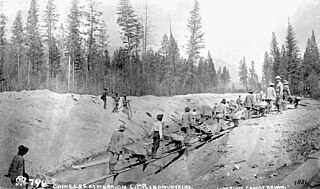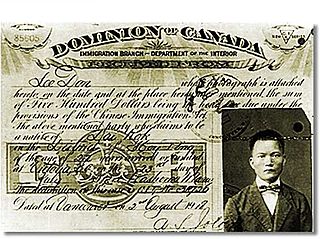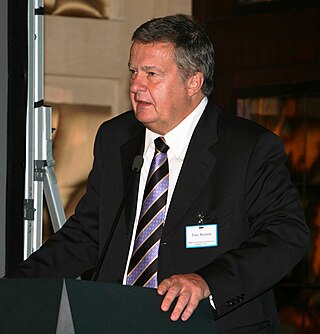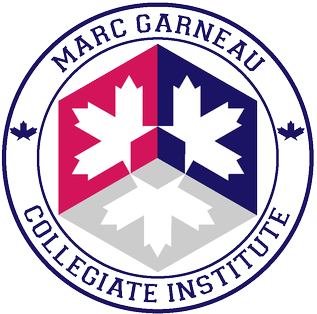Related Research Articles

Chinese immigrants began settling in Canada in the 1780s. The major periods of Chinese immigration would take place from 1858 to 1923 and 1947 to the present day, reflecting changes in the Canadian government's immigration policy.

Maclean's, founded in 1905, is a Canadian news magazine reporting on Canadian issues such as politics, pop culture, and current events. Its founder, publisher John Bayne Maclean, established the magazine to provide a uniquely Canadian perspective on current affairs and to "entertain but also inspire its readers". Rogers Media, the magazine's publisher since 1994, announced in September 2016 that Maclean's would become a monthly beginning January 2017, while continuing to produce a weekly issue on the Texture app. In 2019, the magazine was bought by its current publisher, St. Joseph Communications.
Toronto Life is a monthly magazine about entertainment, politics and life in Toronto, Ontario, Canada. Toronto Life also publishes a number of annual special interest guides about the city, including Real Estate, Stylebook, Eating & Drinking, City Home and Neighbourhoods. Established in 1966, it has been owned by St. Joseph Communications since 2002. Toronto Life has a circulation of 87,929 and readership of 890,000. The magazine is a major winner of the Canadian National Magazine Awards, leading current publications with 110 gold awards including 3 awards for Magazine of the Year in 1985, 1989, and 2007. Toronto Life also won the Magazine Grand Prix award at the 2021 National Magazine Awards, with the jury writing that it is "alert to the cultural moment, bold in its journalistic exposés, up-to-the-minute in its services reportage and smart about the platforms it uses to deliver content to readers. The issues its editorial team assembled during the pandemic showed just how relevant and useful a first-class city magazine can be." It is also known for publishing an annual 50 most influential people in Toronto list.

The Daily of the University of Washington, usually referred to in Seattle simply as The Daily, is the student newspaper of the University of Washington in Seattle, Washington, USA. It is staffed entirely by University of Washington students, excluding the publisher, advertising adviser, accounting staff, and delivery staff.
The Chinese Canadian National Council (CCNC), known in the Chinese-Canadian community as Equal Rights Council (平權會), is an organization whose purpose is to promote equity, social justice, inclusive civic participation, and respect for diversity. The first CCNC in Ontario was founded in 1980.

The Chinese head tax was a fixed fee charged to each Chinese person entering Canada. The head tax was first levied after the Canadian parliament passed the Chinese Immigration Act of 1885 and it was meant to discourage Chinese people from entering Canada after the completion of the Canadian Pacific Railway (CPR). The tax was abolished by the Chinese Immigration Act of 1923, which outright prevented all Chinese immigration except for that of business people, clergy, educators, students, and some others.

Allan Fotheringham was a Canadian newspaper and magazine journalist. He styled himself Dr. Foth and "the Great Gatheringfroth". He was described as "never at a loss for words".

Ezra Isaac Levant is a Canadian media personality, political activist, writer, broadcaster, and former lawyer. Levant is the founder and former publisher of the conservative magazine, The Western Standard. He is also the co-founder, owner, and CEO of the far-right media website Rebel News. Levant has also worked as a columnist for Sun Media, and he hosted a daily program on the Sun News Network from the channel's inception in 2011 until its demise in 2015.

The Chinese Immigration Act, 1885 was an act of the Parliament of Canada that placed a head tax of $50 on all Chinese immigrants entering Canada. It was based on the recommendations of the Royal Commission on Chinese Immigration, which were published in 1885.

Tony Burman is a Canadian broadcaster, journalist and university official. Starting in the 1960s, Burman has worked as a journalist, in print, radio, television, and online. For most of this time, he was at the Canadian Broadcasting Corporation. Later he joined Al Jazeera English. He is also active in supporting public broadcasting and investigative journalism.

Marc Garneau Collegiate Institute, formerly known as Overlea Secondary School, is a high school in Toronto, Ontario, Canada, and part of the Toronto District School Board. It is the host school of the Talented Offerings for Programs in the Sciences (TOPS) program, a math, science and English enrichment program.
On The Record is the masthead news title produced by journalism students at Toronto Metropolitan University in Toronto, Canada. Students produce daily news for the publication's website, live-blog local events relevant to students and broadcast TV news, also available on the website, at least once a week.
Terence "Terry" Dollard Corcoran is columnist and comment editor for the Financial Post section of the Toronto-based National Post.
Andrew Nikiforuk is a Canadian journalist and author. His writing has appeared in many outlets, including Saturday Night, Maclean's, Alberta Views, Alternatives Journal, and national newspapers. He has won multiple National Magazine Awards for his work. In 1990, the Toronto Star awarded him an Atkinson Fellowship in Public Policy to study AIDS and the failure of public health policy. He has also published numerous books, including Saboteurs: Wiebo Ludwig's War Against Oil, which won the Governor General's Award in 2002 and Tar Sands: Dirty Oil and the Future of a Continent, which won the Rachel Carson Environment Book Award for 2008-09 from the Society of Environmental Journalists.
Antisemitism in Canada is the manifestation of hostility, prejudice or discrimination against the Canadian Jewish people or Judaism as a religious, ethnic or racial group. This form of racism has affected Jews since Canada's Jewish community was established in the 18th century.
Racism in Canada traces both historical and contemporary racist community attitudes, as well as governmental negligence and political non-compliance with United Nations human rights standards and incidents in Canada. Contemporary Canada is the product of indigenous First Nations combined with multiple waves of immigration, predominantly from Europe and in modern times, from Asia.
Sunera Thobani is a Tanzanian-Canadian feminist sociologist, academic, and activist. Her research interests include critical race theory, postcolonial feminism, anti-imperialism, Islamophobia, Indigeneity, and the War on Terror. She is currently an associate professor at the Institute for Gender, Race, Sexuality and Social Justice at the University of British Columbia. Thobani is also a founding member of Researchers and Academics of Colour for Equality/Equity (R.A.C.E.), the former president of the National Action Committee on the Status of Women (NAC), and the director for the Centre for Race, Autobiography, Gender, and Age (RAGA).
Laura Robinson is a Canadian sports journalist and author who has reported on sexual abuse as well as racial and sexual discrimination in Canadian sports. She is the author of the 1998 book Crossing the Line: Sexual Assault in Canada’s National Sport.

Desmond Cole is a Canadian journalist, activist, author, and broadcaster who lives in Toronto, Ontario. He was previously a columnist for the Toronto Star and has written for The Walrus, NOW Magazine, Torontoist, The Tyee, Toronto Life, and BuzzFeed. Cole's activism has received national attention, specifically on the issues of police carding, racial discrimination, and dismantling systemic racism.
Sandy Hudson is a Jamaican-Canadian political activist, writer from Toronto, Ontario, Canada. She is the co-founder of the Black Lives Matter movement presence in Canada.
References
- ↑ Smith, Charlie (2010-11-29). "Macleans changes the title of "Too Asian?" article to "The enrollment controversy"". Straight.com. Retrieved 2012-04-04.
- ↑ "Newsmagazine explores Canadian universities as being 'too Asian'". uglychinesecanadian.com. 2012-05-26. Archived from the original on 2012-05-26. Retrieved 2023-08-14.
{{cite web}}: CS1 maint: unfit URL (link) - 1 2 3 "The enrollment controversy". Macleans OnCampus. 2010-11-10. Archived from the original on 2013-12-25. Retrieved 2012-04-04.
- 1 2 3 "Open Letter - A Call to Eliminate Anti-Asian Racism". Asian Canadian Studies. Archived from the original on 2012-04-25. Retrieved 2012-04-04.
- ↑ "'Too Asian,' too racist". Philippine Reporter . 2011-01-28. Archived from the original on 2012-06-08. Retrieved 2012-04-04.
- ↑ Alphonsus, Jonathan (2010-12-01). ""Too asian," Maclean's? How about too racist". Trentarthur.ca. Archived from the original on 2012-04-20. Retrieved 2012-04-04.
- ↑ 38372 [ dead link ]
- 1 2 "Blog Archive » Olivia Chow introduces motion condemning "Too Asian?" article". Olivia Chow, MP. 2010-12-03. Archived from the original on 2013-01-15. Retrieved 2012-04-04.
- ↑ Heer, Jeet (2010-11-15). "Maclean's article on Asians familiar to anti-Semites of old". National Post . Archived from the original on 2012-07-09. Retrieved 2012-04-04.
- ↑ Lum, Zi-Ann (2010-11-11). ""Too Asian?" too racist for a magazine like Maclean's?". The Vancouver Observer. Retrieved 2012-04-04.
- ↑ "Yes, Calling A School "Too Asian" Is Racist". Jezebel.com. 2010-11-11. Retrieved 2012-04-04.
- 1 2 "Etiquette, etc". Etiquette-etc.tumblr.com. 2010-11-17. Archived from the original on 2012-04-25. Retrieved 2012-04-04.
- ↑ Ask a Model Minority Suicide (2010-11-15). "'Too Asian?': Responding to the Question". Hyphen magazine. Retrieved 2012-04-04.
- 1 2 García, Arturo R. (2010-11-12). "Maclean's Magazine revisits old fears with 'Too Asian?' article". Racialicious. Archived from the original on 2012-06-08. Retrieved 2012-04-04.
- ↑ Darch, Krissy (2010-11-25). "Asian, whatever that means". The Vancouver Observer. Archived from the original on 2011-04-19. Retrieved 2012-04-04.
- ↑ Yu, Henry (2010-11-16). "Why Macleans and racism should no longer define Canada". Straight.com. Retrieved 2012-04-04.
- ↑ Chan, Shelly (2010-12-03). ""Too Asian"? We must defend diversity at all costs". The Ring. Retrieved 2012-04-04.
- 1 2 Mahtani, Minelle (2010-11-19). "Canadian media: It's time to cover the undercovered". The Globe and Mail. Toronto. Archived from the original on 2012-11-02. Retrieved 2012-04-04.
- 1 2 Heer, Jeet (2010-11-24). "Too Brazen". The Walrus Blog. Archived from the original on 2012-12-02. Retrieved 2012-04-04.
- ↑ Ghabrial, Sarah (2010-11-17). "When Asians enroll! (And other tales from meritocracy's margins)". Rabble.ca. Retrieved 2012-04-04.
- ↑ Shigematsu, Tetsuro (2011-01-25). "Too Asian?". The Vancouver Observer. Retrieved 2012-04-04.
- ↑ ""Too Asian"? TALK BACK". Facebook. Retrieved 2012-04-04.
- ↑ "UBC forum tackles Maclean's 'Too Asian?' article". UBC Graduate School of Journalism. Archived from the original on 2012-03-08. Retrieved 2012-04-04.
- ↑ "University of Victoria" (PDF).[ dead link ]
- ↑ Wilkinson, Brooke (2011-01-28). "Ryerson hosts 'Too Asian' event". Ryerson School of Journalism, Ryerson University. Archived from the original on 2012-04-25. Retrieved 2012-04-04.
- ↑ "Race in Media and Higher Education: A Town Hall". University College, University of Toronto. 2011-02-15. Archived from the original on 2012-04-06. Retrieved 2012-04-04.
- ↑ "Media racism". Yorku.ca. Archived from the original on 2012-03-14. Retrieved 2012-04-04.
- ↑ "UVSS plans consumer boycott of Maclean's". The Martlet. Archived from the original on 2012-09-05. Retrieved 2012-04-04.
- ↑ "City of Victoria council motion condemning Maclean's 'Too Asian' article". Asian Canadian Studies. 2010-11-25. Archived from the original on 2012-04-25. Retrieved 2012-04-04.
- ↑ Cole, Yolande (2010-12-15). "Vancouver city council passes motion calling for apology on Maclean's "Too Asian?" article". Straight.com. Retrieved 2012-04-04.
- ↑ Cole, Yolande (2010-12-17). "Toronto becomes third city to condemn Maclean's "Too Asian" article". Straight.com. Retrieved 2012-04-04.
- ↑ "CCNC Welcomes Markham Council Motion". Chinese Canadian National Council. 2011-02-09. Archived from the original on 2012-04-15. Retrieved 2012-04-04.
- ↑ "Richmond Hill's 'Too Asian' motion praised". yorkregion.com. 2011-02-17. Retrieved 2015-01-31.
- ↑ Poy, Vivienne (2010-12-16). "Letter to The Hon. James Moore, Minister of Canadian Heritage and Official Languages" (PDF). viviennepoy.ca. Retrieved 2015-01-31.
- ↑ "CCNC Statement on Dialogue with Maclean's". Chinese Canadian National Council. 2010-11-22. Archived from the original on 2012-04-15. Retrieved 2012-04-04.
- ↑ "Maclean's Issues Clarification". Newswire.ca. 2010-11-10. Archived from the original on 2012-06-02. Retrieved 2012-04-04.
- ↑ Maclean's changes title Too Asian article enrollment controversy [ dead link ]
- ↑ "Merit: the best and only way to decide who gets into university". Maclean's Magazine. 2010-11-25. Retrieved 2012-04-04.
- ↑ Wente, Margaret (2010-11-23). "Where cherished values collide". The Globe and Mail. Toronto. Retrieved 2012-04-04.
- ↑ Kay, Barbara (2010-11-23). "Maclean's owed an apology over anti-Asian racism claims". National Post. Archived from the original on 2012-07-08. Retrieved 2012-04-04.
- ↑ Yu, Henry (2010-11-27). "Macleans offers a nonapology for writing a nonstory called "Too Asian?"". Straight.com. Retrieved 2012-04-04.
- ↑ Miller, John (2011-01-27). "Blog: Shame on Maclean's". The Journalism Doctor. Retrieved 2012-04-04.
- ↑ Neil, Janice (2011-06-17). "Maclean's Ken Whyte promoted to head Rogers Publishing". Canadian Journalism Project. Archived from the original on 2016-08-21. Retrieved 2012-04-04.
- ↑ English, Kathy (2010-11-20). "English: Star falls below its standard". Toronto Star. Retrieved 2015-01-31.
- ↑ Chatterjee, Soma (2010-11-24). "Maclean's and The Toronto Star: The Asian invasion of higher education". Rabble.ca. Retrieved 2012-04-04.
- ↑ Groesbeck, Susan R. (2010-12-08). "Havergal College does not encourage racism". Vancouver Courier. Archived from the original on 2012-05-31. Retrieved 2012-04-04.
- ↑ "CCNC Responds to Maclean's Statement". Chinese Canadian National Council. 2010-12-19. Archived from the original on 2012-04-15. Retrieved 2012-04-04.
- ↑ "UBCCVC Response to Macleans "Too Asian?"". Brian Cheung. 2010-12-10. Archived from the original on 2012-04-25. Retrieved 2012-04-04.